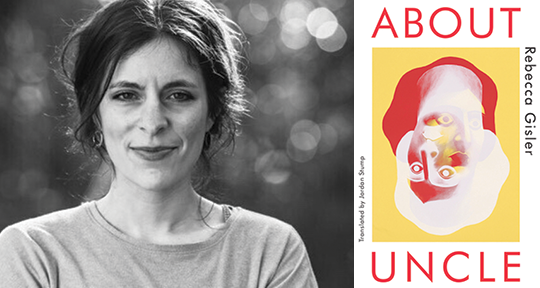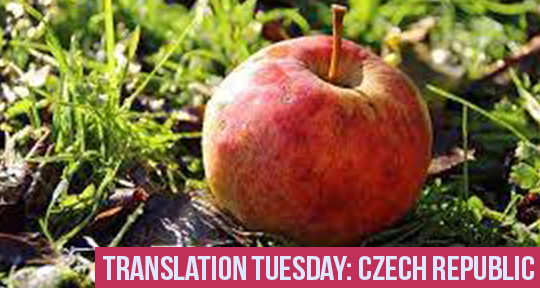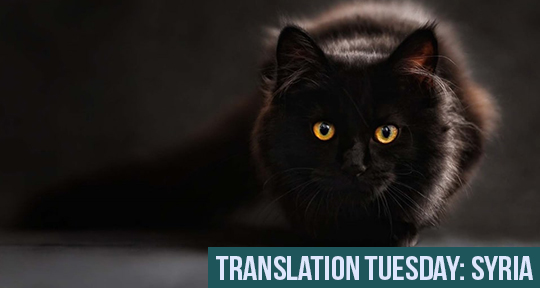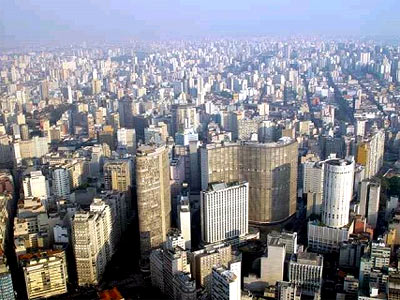A game of magical thinking leads to a teen’s traumatic coming-of-age in Lidmila Kábrtová’s short story “Glass Apples,” this week’s Translation Tuesday selection. Decay and growth surround our speaker as she pursues a crush, though her excitement and anticipation betray her as she discovers a sinister and predatory side to young love. Of note is the speaker’s voice, initially full of hyperbole and youthful naiveté. A first-person narrative of meandering thoughts segues into a moment of subtle disembodiment (CW: sexual assault) as the speaker refers to “the body” instead of “my body,” and all the while rotting “forbidden” fruit provides a literal background to our protagonist’s fear and disillusionment.
It’s pitch black. Even though I’m being very careful, I can still feel myself standing on apples. There are so many that it’s impossible to avoid them, so I don’t. They crunch underfoot, turning into a sticky, sour-smelling mush. They are summer apples, but Gran, who I’m staying with over the summer holidays, calls them glass apples because they have such fine white skins that they almost look like they’re made of glass. They bruise easily—in fact, all you have to do is handle them a bit roughly and almost at once horrid marks appear on their soft apple skin and quickly turn brown. These apples don’t even taste very nice: at first they’re hard, bitter and tart, and then almost instantly they become floury and not nearly as sweet as, say Holovousy or reinettes, so they’re no good for anything except strudel. Gran bakes strudel with them regularly, twice a week. Even with the bashed and rotten ones. Which is just about all of them. The two of us always have a lot of coring to do. Gran even knows how to core the really, really bad ones. But not even Gran could make anything out of these ones.
My skin is really delicate too. Like glass. Gran says it’s like those apples. She says it all the time. I liked her saying it to me when I was ten, but now that I’m sixteen it’s really annoying. It’s also annoying how she’s always checking up on where I’m going, who with, and what time I’ll be back. I’m sixteen and I don’t want my Gran on my back all the time!
Last year I could still talk to her about a lot of things. But now I don’t want to talk to her about anything. Not about apples and certainly not about Štěpán. Definitely not him. Or anything to do with tonight. I just want to get home quietly so Gran doesn’t hear me. I’ll have to wash my shoes too, as they’ll be filthy from all of the apple mush.
I know I promised Gran I wouldn’t go to the dance. And then I climbed out my bedroom window. It’s on the ground floor, so you don’t have to jump from very high up. I’ve never tricked Gran before—well, at least never this much. But I just had to. Going out was a matter of life and death. Gran wouldn’t have understood. She would have said: Tereza, there’ll be other dances. In a year or two when you’re older and more responsible . . .
But how could Gran know what it was like not to see Štěpán, when it was obvious he’d be at the party? How could I lie under the duvet and try to close my eyes when all I could see going round my head were all the girls around him squealing, just so he’d notice them?
I didn’t have to squeal. He whistled over to me this afternoon when I was in the garden: “Are you coming, Tereza? It’s just a stupid dance, but better than nothing . . .” And he had his head tilted to one side in a really cute way and was kicking a stone on the ground.
Štěpán, the best-looking boy in the village. All of the girls were after him. Of course I was aware of him too, but the past two years he had acted as if I meant less than nothing to him. As if he didn’t register me. As if I didn’t exist.
“Yeah, I’ll come.”
“See you at nine then,” he said and disappeared. READ MORE…




